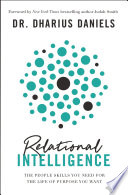

Relational Intelligence (RQ) is the ability to understand and manage relationships effectively. It encompasses emotional intelligence, social skills, and the ability to navigate complex interpersonal dynamics. The book emphasizes that RQ is not just about being likable; it's about building meaningful connections that foster collaboration and innovation. The author argues that in today's interconnected world, having high RQ is essential for personal and professional success. By understanding RQ, individuals can enhance their communication skills, empathize with others, and create a more inclusive environment that encourages diverse perspectives.
Continue readingThe book breaks down RQ into several key components: self-awareness, empathy, social skills, and relationship management. Self-awareness involves recognizing one's own emotions and how they affect interactions with others. Empathy is the ability to understand and share the feelings of others, which is crucial for building rapport. Social skills refer to the ability to communicate effectively and build networks. Relationship management encompasses the strategies used to maintain and enhance relationships over time. Each component is explored in detail, with practical examples and exercises to help readers develop their RQ.
Continue readingOne of the most profound insights in the book is the importance of vulnerability in building authentic relationships. The author argues that being vulnerable allows individuals to connect on a deeper level, fostering trust and openness. The book provides strategies for embracing vulnerability, such as sharing personal stories and being transparent about challenges. The author emphasizes that vulnerability is not a weakness; rather, it is a strength that can lead to more meaningful connections and stronger partnerships, both personally and professionally.
Continue readingConflict is an inevitable part of any relationship, whether in the workplace or personal life. The book offers strategies for navigating conflict effectively using RQ. This includes understanding the underlying emotions driving the conflict, actively listening to the other party, and seeking common ground. The author emphasizes the importance of maintaining respect and empathy during disagreements. By applying RQ principles, individuals can turn conflicts into opportunities for growth and collaboration, ultimately strengthening their relationships.
Continue readingThe book highlights the importance of creating a culture that values relational intelligence within organizations. This involves fostering an environment where open communication, collaboration, and mutual respect are prioritized. The author provides actionable strategies for leaders to cultivate RQ within their teams, such as promoting team-building activities, encouraging feedback, and recognizing the contributions of each member. By embedding RQ into the organizational culture, companies can enhance employee engagement, innovation, and overall performance.
Continue readingIn the digital age, technology plays a significant role in shaping relationships. The book explores how social media, virtual communication, and other technological advancements can both enhance and hinder relational intelligence. While technology can facilitate connections, it can also lead to misunderstandings and superficial interactions. The author encourages readers to be mindful of their digital interactions and to strive for authenticity in their online relationships. Balancing technology with face-to-face communication is crucial for maintaining strong connections.
Continue readingThe final section of the book focuses on practical applications of RQ in various contexts, including leadership, teamwork, and personal relationships. The author provides exercises and reflection prompts to help readers apply RQ principles in their daily lives. This includes setting relational goals, practicing active listening, and seeking feedback from others. By incorporating RQ into everyday interactions, individuals can enhance their relationships and achieve greater success in both personal and professional spheres.
Continue readingThe reading time for Relational Intelligence depends on the reader's pace. However, this concise book summary covers the 7 key ideas from Relational Intelligence, allowing you to quickly understand the main concepts, insights, and practical applications in around 24 min.
Relational Intelligence is definitely worth reading. The book covers essential topics including Understanding Relational Intelligence, The Components of Relational Intelligence, The Role of Vulnerability in Relationships, providing practical insights and actionable advice. Whether you read the full book or our concise summary, Relational Intelligence delivers valuable knowledge that can help you improve your understanding and apply these concepts in your personal or professional life.
Relational Intelligence was written by Dharius Daniels.
If you enjoyed Relational Intelligence by Dharius Daniels and want to explore similar topics or deepen your understanding, we highly recommend these related book summaries:
These books cover related themes, complementary concepts, and will help you build upon the knowledge gained from Relational Intelligence. Each of these summaries provides concise insights that can further enhance your understanding and practical application of the ideas presented in Relational Intelligence.